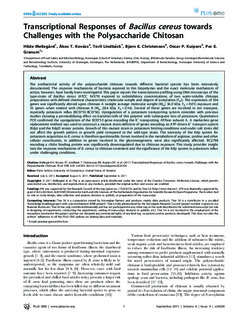| dc.contributor.author | Mellegård, Hilde | |
| dc.contributor.author | Kovács, Ákos T. | |
| dc.contributor.author | Lindback, Toril | |
| dc.contributor.author | Christensen, Bjørn Erik | |
| dc.contributor.author | Kuipers, Oscar P. | |
| dc.contributor.author | Granum, Per Einar | |
| dc.date.accessioned | 2015-10-30T11:13:32Z | |
| dc.date.accessioned | 2015-12-10T12:33:47Z | |
| dc.date.available | 2015-10-30T11:13:32Z | |
| dc.date.available | 2015-12-10T12:33:47Z | |
| dc.date.issued | 2011 | |
| dc.identifier.citation | PLoS ONE 2011, 6(9) | nb_NO |
| dc.identifier.issn | 1932-6203 | |
| dc.identifier.uri | http://hdl.handle.net/11250/2367470 | |
| dc.description.abstract | The antibacterial activity of the polysaccharide chitosan towards different bacterial species has been extensively documented. The response mechanisms of bacteria exposed to this biopolymer and the exact molecular mechanism of action, however, have hardly been investigated. This paper reports the transcriptome profiling using DNA microarrays of the type-strain of Bacillus cereus (ATCC 14579) exposed to subinhibitory concentrations of two water-soluble chitosan preparations with defined chemical characteristics (molecular weight and degree of acetylation (FA)). The expression of 104 genes was significantly altered upon chitosan A (weight average molecular weight (Mw) 36.0 kDa, FA = 0.01) exposure and 55 genes when treated with chitosan B (Mw 28.4 kDa, FA = 0.16). Several of these genes are involved in ion transport, especially potassium influx (BC0753-BC0756). Upregulation of a potassium transporting system coincides with previous studies showing a permeabilizing effect on bacterial cells of this polymer with subsequent loss of potassium. Quantitative PCR confirmed the upregulation of the BC0753 gene encoding the K+-transporting ATPase subunit A. A markerless gene replacement method was used to construct a mutant strain deficient of genes encoding an ATP-driven K+ transport system (Kdp) and the KdpD sensor protein. Growth of this mutant strain in potassium limiting conditions and under salt stress did not affect the growth pattern or growth yield compared to the wild-type strain. The necessity of the Kdp system for potassium acquisition in B. cereus is therefore questionable. Genes involved in the metabolism of arginine, proline and other cellular constituents, in addition to genes involved in the gluconeogenesis, were also significantly affected. BC2798 encoding a chitin binding protein was significantly downregulated due to chitosan exposure. This study provides insight into the response mechanisms of B. cereus to chitosan treatment and the significance of the Kdp system in potassium influx under challenging conditions. | nb_NO |
| dc.language.iso | eng | nb_NO |
| dc.publisher | Public Library of Science | nb_NO |
| dc.title | Transcriptional responses of Bacillus cereus towards challenges with the polysaccharide chitosan | nb_NO |
| dc.type | Journal article | nb_NO |
| dc.type | Peer reviewed | en_GB |
| dc.date.updated | 2015-10-30T11:13:32Z | |
| dc.source.volume | 6 | nb_NO |
| dc.source.journal | PLoS ONE | nb_NO |
| dc.source.issue | 9 | nb_NO |
| dc.identifier.doi | 10.1371/journal.pone.0024304 | |
| dc.identifier.cristin | 838503 | |
| dc.description.localcode | © 2011 Mellegård et al. This is an open-access article distributed under the terms of the Creative Commons Attribution License, which permits unrestricted use, distribution, and reproduction in any medium, provided the original author and source are credited. | nb_NO |
